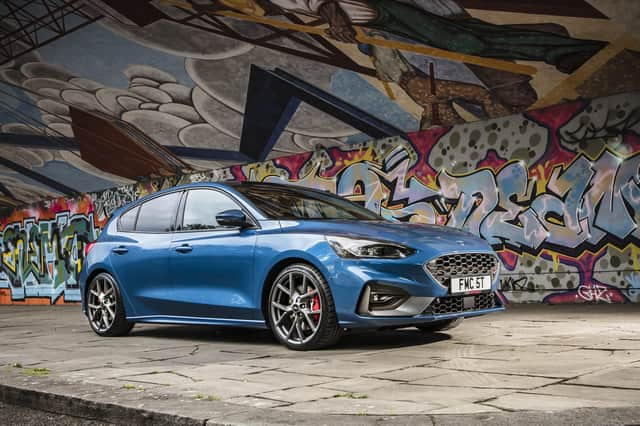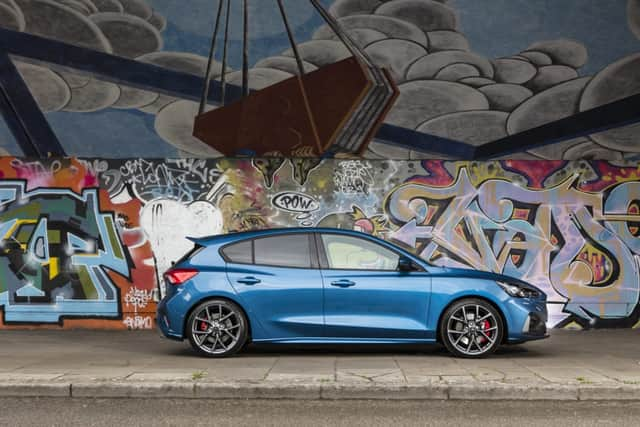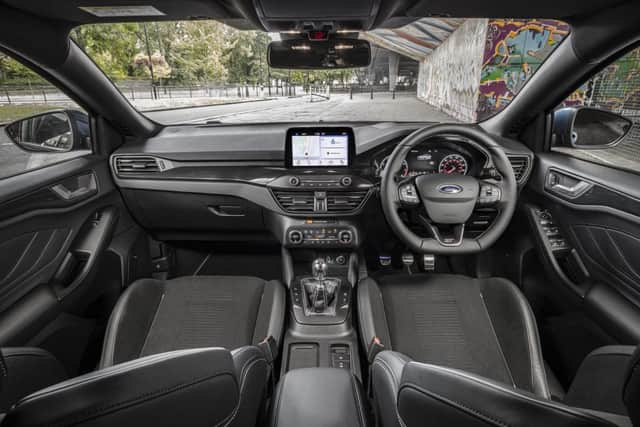Ford Focus ST EcoBlue review


Many purists will tell you you can’t have a diesel hot hatch.
In fact, the idea of a diesel Ford Focus wearing an ST badge is downright blasphemy to some. But the popularity of the previous diesel Focus ST and long-term success of Skoda’s oil-burning Octavia vRS show there is a thirst for sporty models that don’t gulp gallons of unleaded.
Advertisement
Hide AdAdvertisement
Hide AdSo whether the purists like it, and whether or not they have a point, Ford does indeed offer a diesel-powered version of its current range-topping hot hatch.
Not that there are any obvious indications that this particular ST is a diesel. In fact, nowhere does Ford call it a diesel. Instead, it’s sold as the ST EcoBlue. But under the bonnet is a 2.0-litre, four-cylinder diesel with a regulation 187bhp being sent to the front wheels.


Ford Focus ST EcoBlue
- Price: £30,575 (£31,625 as tested)
- Engine: 2.0-litre, four-cylinder, diesel
- Power: 187bhp
- Torque: 295lb ft
- Transmission: Six-speed manual
- Top speed: 137mph
- 0-62mph: 7.6 seconds
- Economy: 42.2-56.54mpg
- CO2 emissions: 148g/km
And while it might not look different from the outside, from behind the wheel, the EcoBlue is a different proposition to the 2.3-litre 276bhp EcoBoost.
For a start, there’s a different feel to how the diesel ST puts down its power and gathers pace, despite advances which mean diesels are no longer laggy and turbo petrols have more torque than they used to.
A large part of the difference is down to petrol’s extra 80bhp over the diesel, even if torque is more comparable. The diesel just doesn’t feel as immediate or lively as the revvy 2.3-litre petrol and its pace is slower, with 0-62mph taking 7.6 seconds rather than 5.7.
The old days of nothing-whoosh-nothing diesel are long gone but in the EcoBlue ST there’s still more shove from lower down and you’ll feel the power tail off at higher revs. That means you’ll drive the diesel differently, more often pushing along on the torque than bothering to drop down a gear. And with 295lb ft, in-gear acceleration is impressive. Of course, if you want to hop around the gears, the six-speed manual is quick and smooth and, with the fitted performance pack, will even rev match your downshifts for you. That performance pack also brings launch control and shift indicator to up the sportiness.


But it’s just not as involving or “hot hatch-y” as the petrol. And it’s a similar story when it comes to handling. The ST diesel is still sharp but lacks the ultimate cutting edge of the petrol model. For starters, while the petrol gets an electronic limited slip diff and optional adaptive suspension, the diesel does without either of these. It does still get specially tuned sports suspension, which improves on the standard Focus’s impressive precision and grip. So it’s quick and willing and can drag itself through twisting sections of B-road with composure, just without that final precision of the petrol model. On the flip side, it rides with a little more suppleness when you’re taking it easy.
Visually the only difference between the ST variants are the exhaust tailpipes. Otherwise, petrol and diesel alike get some muscular bodywork additions, with unique bumpers, grilles and side skirts, a bigger spoiler plus ST badges and 19-inch alloys behind which lurk red painted brake calipers.
Advertisement
Hide AdAdvertisement
Hide AdInside, the cabin is largely the standard Focus affair but with grippy Recaro sports seats, alloy-finished pedals, some carbon-effect trim and stainless steel ST scuff plates. Everything is easy to find and user-friendly and, as befits a range-topping model, kit such as adaptive cruise control and lane centring assist, heated steering wheel, a B&O sound system and adaptive LED lights are standard for your £30,000 (around £3k less than the petrol).
That saving is enhanced by the diesel’s frugality - around 52mpg against 35 - but it comes at the cost of engagement. If you want a full-on every-drive-is-a-thrill experience, this diesel ST will leave you a little cold. It’s not as powerful, lively or as sharp as its petrol counterpart. That said, it’s still quick and precise but with a more relaxed edge for when you don’t feel like giving it 10 tenths, and it still has the edge as a competent quick cruiser compared with equivalent diesels from other brands.